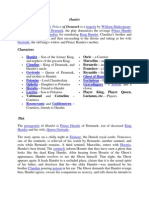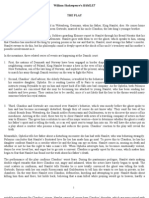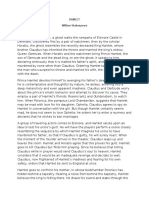Summary of Hamlet
Summary of Hamlet
Uploaded by
gabrielluis08Copyright:
Available Formats
Summary of Hamlet
Summary of Hamlet
Uploaded by
gabrielluis08Copyright
Available Formats
Share this document
Did you find this document useful?
Is this content inappropriate?
Copyright:
Available Formats
Summary of Hamlet
Summary of Hamlet
Uploaded by
gabrielluis08Copyright:
Available Formats
Summary Of Hamlet
y y y y y y y y y
ClaudiusKing of Denmark HamletSon of the former king, and nephew of the present King GertrudeQueen of Denmark, and mother to Hamlet PoloniusLord Chamberlain OpheliaDaughter to Polonius HoratioFriend to Hamlet LaertesSon to Polonius Voltimand, CorneliusCourtiers Rosencrantz, GuildensternCourtiers, friends to Hamlet
y y y y y y y y y
Osrica Courtier Marcellusan Officer Bernardoan Officer Franciscoa Soldier ReynaldoServant to Polonius Ghost of Hamlet's Father FortinbrasPrince of Norway GravediggersA sexton and a clown Player King, Player Queen, Lucianus, etc. Players
The protagonist of Hamlet is Prince Hamlet of Denmark, son of the lately deceased King Hamlet and his wife, Queen Gertrude. The story opens on a chilly night at Elsinore, the Danish royal castle. Francisco, one of the sentinels, is relieved of his watch by Bernardo, another sentinel, and exits while Bernardo remains. A third sentinel, Marcellus, enters with Horatio, Hamlet's best friend. The sentinels inform Horatio that they have seen a ghost that looks like the dead King Hamlet. After hearing from Horatio of the Ghost's appearance, Hamlet resolves to see the Ghost himself. That night, the Ghost appears again. It leads Hamlet to a secluded place, claims that it is the actual spirit of his father, and discloses that hethe elder Hamletwas murdered by Claudius' pouring poison in his ear. The Ghost demands that Hamlet avenge him; Hamlet agrees, swears his companions to secrecy, and tells them he intends to "put an antic disposition on" (presumably to avert suspicion). Hamlet initially attests to the ghost's reliability, calling him both an "honest ghost" and "truepenny." Later, however, he expresses doubts about the ghost's nature and intent, claiming these as reasons for his inaction. Polonius is Claudius' trusted chief counsellor; Polonius's son, Laertes, is returning to France, and Polonius's daughter, Ophelia, is courted by Hamlet. Both Polonius and Laertes warn Ophelia that Hamlet is surely not serious about her. Shortly afterward, Ophelia is alarmed by Hamlet's strange behaviour, reporting to her father that Hamlet rushed into her room, stared at her, and said nothing. Polonius assumes that the "ecstasy of love" is responsible for Hamlet's "mad" behavior, and he informs Claudius and Gertrude. Perturbed by Hamlet's continuing deep mourning for his father and his increasingly erratic behavior, Claudius sends for two of Hamlet's acquaintances Rosencrantz and Guildenstern to find out the cause of Hamlet's changed behavior. Hamlet greets his friends warmly but quickly discerns that they have been sent to spy on him. Together, Claudius and Polonius convince Ophelia to speak with Hamlet while they secretly listen. When Hamlet enters, she offers to return his remembrances, upon which Hamlet questions her honesty and furiously rants at her to "get thee to a nunnery." Hamlet remains uncertain whether the Ghost has told him the truth, but the arrival of a troupe of actors at Elsinore presents him with a solution. He will have them stage a play, The Murder of Gonzago, reenacting his father's murder and determine Claudius's guilt or innocence by studying his reaction to it. The court assembles to watch the play; Hamlet provides an agitated running commentary throughout.
When the murder scene is presented, Claudius abruptly rises and leaves the room, which Hamlet sees as proof of his uncle's guilt. Gertrude summons Hamlet to her closet to demand an explanation. On his way, Hamlet passes Claudius in prayer, but hesitates to kill him, reasoning that death in prayer would send him to heaven. However, it is revealed that the King is not truly praying, remarking that "words" never made it to heaven without "thoughts." An argument erupts between Hamlet and Gertrude. Polonius, spying on the scene from behind an arras and convinced that the prince's madness is indeed real, panics when it seems as if Hamlet is about to murder the Queen and cries out for help. Hamlet, believing it is Claudius hiding behind the arras, stabs wildly through the cloth, killing Polonius. When he realizes that he has killed Ophelia's father, he is not remorseful, but calls Polonius "Thou wretched, rash, intruding fool." The Ghost appears, urging Hamlet to treat Gertrude gently, but reminding him to kill Claudius. Unable to see or hear the Ghost herself, Gertrude takes Hamlet's conversation with it as further evidence of madness. Claudius, now fearing for his life, finds a legitimate excuse to get rid of the prince: he sends Hamlet to England on a diplomatic pretext, accompanied (and closely watched) by Rosencrantz and Guildenstern. Alone, Claudius discloses that he is actually sending Hamlet to his death. Prior to embarking for England, Hamlet hides Polonius's body, ultimately revealing its location to the King. Upon leaving Elsinore, Hamlet encounters the army of Prince Fortinbras en route to do battle in Poland. Upon witnessing so many men going to their death on the brash whim of an impulsive prince, Hamlet declares, "O, from this time forth, / My thoughts be bloody, or be nothing worth!" At Elsinore, further demented by grief at her father Polonius's death, Ophelia wanders the castle, acting erratically and singing bawdy songs. Her brother, Laertes, returns from France, horrified by his father's death and his sister's madness. She appears briefly to give out herbs and flowers. Claudius convinces Laertes that Hamlet is solely responsible; then news arrives that Hamlet is still alive a story is spread that his ship was attacked by pirates on the way to England, and he has returned to Denmark. Claudius swiftly concocts a plot to kill his nephew but make it appear to be an accident, taking all of the blame off his shoulders. Knowing of Hamlet's jealousy of Laertes' prowess with a sword, he proposes a fencing match between the two. Laertes, enraged at the murder of his father, informs the king that he will further poison the tip of his sword so that a mere scratch would mean certain death. Claudius, unsure that capable Hamlet could receive even a scratch, plans to offer Hamlet poisoned wine if that fails. Gertrude enters to report that Ophelia has drowned. In the Elsinore churchyard, two "clowns", typically represented as "gravediggers," enter to prepare Ophelia's grave, and, although the coroner has ruled her death accidental so that she may receive Christian burial, they argue about its being a case of suicide. Hamlet arrives with Horatio and banters with one of them, who unearths the skull of a jester whom Hamlet once knew, Yorick ("Alas, Poor Yorick; I knew him, Horatio."). Ophelia's funeral procession approaches, led by her mournful brother Laertes. Distraught at the lack of ceremony (due to the actually-deemed suicide) and overcome by emotion, Laertes leaps into the grave, cursing Hamlet as the cause of her death. Hamlet interrupts, professing his own love and grief for Ophelia. He and Laertes grapple, but the fight is broken up by Claudius and Gertrude. Claudius reminds Laertes of the planned fencing match. Later that day, Hamlet tells Horatio how he escaped death on his journey, disclosing that Rosencrantz and Guildenstern have been sent to their deaths instead. A courtier, Osric, interrupts to invite Hamlet to fence with Laertes. Despite Horatio's warnings, Hamlet accepts and the match begins. After several rounds, Gertrude toasts Hamletagainst the urgent warning of Claudiusaccidentally drinking the wine he poisoned. Between bouts, Laertes attacks and pierces Hamlet with his poisoned blade; in the ensuing
scuffle, Hamlet is able to use Laertes's own poisoned sword against him. Gertrude falls and, in her dying breath, announces that she has been poisoned. In his dying moments, Laertes is reconciled with Hamlet and reveals Claudius's murderous plot. Hamlet stabs Claudius with the poisoned sword, and then forces him to drink from his own poisoned cup to make sure he dies. In his final moments, Hamlet names Prince Fortinbras of Norway as the probable heir to the throne, since the Danish kingship is an elected position, with the country's nobles having the final say. Horatio attempts to kill himself with the same poisoned wine, but is stopped by Hamletwho commands him to tell the story, as he will be the only one left alive who can give a full account. When Fortinbras arrives to greet King Claudius, he encounters the deadly scene: Gertrude, Claudius, Laertes, and Hamlet are all dead. Horatio asks to be allowed to recount the tale to "the yet unknowing world," and Fortinbras orders Hamlet's body borne off in honour.
You might also like
- Hamlet SummaryDocument4 pagesHamlet SummaryElena LazarNo ratings yet
- HamletDocument28 pagesHamletErold TarvinaNo ratings yet
- Tragedy William Shakespeare Kingdom of Denmark Prince Hamlet Claudius King Hamlet GertrudeDocument4 pagesTragedy William Shakespeare Kingdom of Denmark Prince Hamlet Claudius King Hamlet Gertrudesah108_pk796No ratings yet
- Hamlet SekspirDocument2 pagesHamlet SekspirOljaVasiljevicNo ratings yet
- Hamlet PDFDocument120 pagesHamlet PDFHumayun LitonNo ratings yet
- Act I: Prince Hamlet King Hamlet King Claudius NorwayDocument16 pagesAct I: Prince Hamlet King Hamlet King Claudius NorwayRen TagaoNo ratings yet
- Act I: Prince Hamlet King Hamlet King ClaudiusDocument39 pagesAct I: Prince Hamlet King Hamlet King ClaudiusRen TagaoNo ratings yet
- The Tragical History of HamletDocument4 pagesThe Tragical History of HamletSilviu CirsteaNo ratings yet
- HamletDocument3 pagesHamletMARISOL SOARESNo ratings yet
- The Play Opens Soon After The Death of The King of DenmarkDocument40 pagesThe Play Opens Soon After The Death of The King of DenmarkPixie TrixieNo ratings yet
- Hamlet SummaryDocument3 pagesHamlet SummaryM sufian NawazNo ratings yet
- HamletDocument2 pagesHamletfarhanieNo ratings yet
- Letersi AnglezeDocument37 pagesLetersi AnglezeTan TopçiuNo ratings yet
- HamletDocument14 pagesHamletHaris Imamovic100% (1)
- Hamlet W.S.Document5 pagesHamlet W.S.TeoNo ratings yet
- UntitledDocument5 pagesUntitledInu InuNo ratings yet
- HamletDocument11 pagesHamletLa neigeNo ratings yet
- Hamlet (Summary)Document2 pagesHamlet (Summary)হাবিব রহমান100% (2)
- Hamlet Hamlet: Shakespeare Play Hamlet (Play)Document29 pagesHamlet Hamlet: Shakespeare Play Hamlet (Play)Pradip Tripathi100% (1)
- Full Book Summary: Featured On SparknotesDocument2 pagesFull Book Summary: Featured On SparknotesAbdulAzizMehsudNo ratings yet
- Hamlet Plot OverviewDocument2 pagesHamlet Plot OverviewpricopluminitaNo ratings yet
- Act 4Document3 pagesAct 4youssefahmedyoussefhusseinNo ratings yet
- Summary of HamletDocument2 pagesSummary of HamletPhương TrâmNo ratings yet
- Hamlet: William ShakespeareDocument4 pagesHamlet: William ShakespeareAdriana AndrecaNo ratings yet
- Hamlet ShmoopDocument18 pagesHamlet ShmoopGreen ShootsNo ratings yet
- Hamlet SummaryDocument3 pagesHamlet SummaryDemi DinagebaNo ratings yet
- Makalah HamletDocument3 pagesMakalah HamletFebrian EffendiNo ratings yet
- Hamlet PlotDocument3 pagesHamlet PlotMP2000No ratings yet
- HamletDocument34 pagesHamletgennie1100% (1)
- Plot Overview: HamletDocument6 pagesPlot Overview: HamletDha NanNo ratings yet
- HamletDocument3 pagesHamletSandy BalasoiuNo ratings yet
- Hamlet Summary PDFDocument3 pagesHamlet Summary PDFdeathmouse50% (4)
- Hamlet by William Shakespeare NotesDocument20 pagesHamlet by William Shakespeare NotesKainat TufailNo ratings yet
- Summary of HamletDocument54 pagesSummary of HamletrockcrunchNo ratings yet
- Full Book Summary: Claudius Gertrude HamletDocument52 pagesFull Book Summary: Claudius Gertrude HamletkrsNo ratings yet
- Hamlet Plot OverviewDocument7 pagesHamlet Plot OverviewAApril HunterNo ratings yet
- William Shakespeare'S: HamletDocument172 pagesWilliam Shakespeare'S: HamletSunita BansalNo ratings yet
- William Shakespeare'S: HamletDocument172 pagesWilliam Shakespeare'S: HamletSunita BansalNo ratings yet
- Hamlet PlotDocument2 pagesHamlet PlotjordanjabuNo ratings yet
- Hamlet Act IDocument2 pagesHamlet Act ITheaaaNo ratings yet
- Hamlet - Plot Overview: N A Dark Winter NightDocument3 pagesHamlet - Plot Overview: N A Dark Winter NightDiana DiaNo ratings yet
- HAMLET Formalist CriticismDocument4 pagesHAMLET Formalist Criticismdennis50% (2)
- Click To Edit Master Subtitle StyleDocument12 pagesClick To Edit Master Subtitle StyleIshani MittalNo ratings yet
- Hamlet: Prince Hamlet King Hamlet Queen Gertrude Claudius Norway Fortinbras Elsinore Horatio SentinelsDocument16 pagesHamlet: Prince Hamlet King Hamlet Queen Gertrude Claudius Norway Fortinbras Elsinore Horatio SentinelsGothicAnkhNo ratings yet
- Hamlet Dramatis PersonaeDocument5 pagesHamlet Dramatis Personae7angyg8No ratings yet
- HamletDocument5 pagesHamletGuilliane GallanoNo ratings yet
- HAMLETDocument21 pagesHAMLETLuísa Lana ViegasNo ratings yet
- On A Dark Winter NightDocument3 pagesOn A Dark Winter NightDaanish MalikNo ratings yet
- Hamlet - Plot OverviewDocument4 pagesHamlet - Plot OverviewAlina CiobotaruNo ratings yet
- Rizka Alifah (1603046081)Document5 pagesRizka Alifah (1603046081)rizka alifahNo ratings yet
- Hamlet: The Tragedy of Hamlet, Prince of Denmark, or More Simply Hamlet, Is ADocument27 pagesHamlet: The Tragedy of Hamlet, Prince of Denmark, or More Simply Hamlet, Is ABojana MarjanovićNo ratings yet
- Hamlet Summary: This Above All: To Thine Own Self Be TrueDocument5 pagesHamlet Summary: This Above All: To Thine Own Self Be TrueErika Joy GutierrezNo ratings yet
- Hamlet SummaryDocument2 pagesHamlet SummaryRaphaela Lei100% (1)
- hamlet-studentsDocument14 pageshamlet-studentsbdbiswajits2No ratings yet
- Summary of Scenes of HAMLETDocument8 pagesSummary of Scenes of HAMLETJosephine Flores100% (1)
- TimelineDocument54 pagesTimelineapi-248548305No ratings yet
- Hamlet SummaryDocument19 pagesHamlet SummaryGigi Duru'100% (1)
- The Hamlet Companion (Includes Study Guide, Complete Unabridged Book, Historical Context, Biography, and Character Index)From EverandThe Hamlet Companion (Includes Study Guide, Complete Unabridged Book, Historical Context, Biography, and Character Index)No ratings yet
- Hamlet MWDS Page 1Document1 pageHamlet MWDS Page 1Michael MorganNo ratings yet
- Making Sense of Hamlet! A Students Guide to Shakespeare's Play (Includes Study Guide, Biography, and Modern Retelling)From EverandMaking Sense of Hamlet! A Students Guide to Shakespeare's Play (Includes Study Guide, Biography, and Modern Retelling)No ratings yet
- Alphabet of Inventions and TechnologyDocument12 pagesAlphabet of Inventions and Technologygabrielluis08No ratings yet
- Protozoa: Protozoa (From The Greek Words Proto, Meaning "First", and Zoa, Meaning "Animals") Is A GroupingDocument8 pagesProtozoa: Protozoa (From The Greek Words Proto, Meaning "First", and Zoa, Meaning "Animals") Is A Groupinggabrielluis08No ratings yet
- 15 Filipino ScientistsDocument4 pages15 Filipino Scientistsgabrielluis08No ratings yet
- Musical Instruments of ThailandDocument19 pagesMusical Instruments of Thailandgabrielluis08100% (8)
- Asexual ReproductionDocument6 pagesAsexual Reproductiongabrielluis08No ratings yet
- Romeo & JulietDocument21 pagesRomeo & Julietgabrielluis08No ratings yet
- Summarized Romeo & JulietDocument7 pagesSummarized Romeo & Julietgabrielluis08No ratings yet
- Musical Instruments of IndiaDocument12 pagesMusical Instruments of Indiagabrielluis08No ratings yet
- Musical Instrument of IndonesiaDocument10 pagesMusical Instrument of Indonesiagabrielluis08100% (4)
- MathematiciansDocument41 pagesMathematiciansgabrielluis08No ratings yet
- Gagaku InstrumentsDocument12 pagesGagaku Instrumentsgabrielluis08No ratings yet
- Cookie RecipesDocument10 pagesCookie Recipesgabrielluis08100% (1)
- Examples of EvolutionDocument3 pagesExamples of Evolutiongabrielluis08No ratings yet
- African InstrumentsDocument7 pagesAfrican Instrumentsgabrielluis08No ratings yet
- Biography of Classical ComposersDocument5 pagesBiography of Classical Composersgabrielluis08No ratings yet
- Kingdom Plantae CompleteDocument21 pagesKingdom Plantae Completegabrielluis08No ratings yet
- Kingdom Fungi PhylumsDocument10 pagesKingdom Fungi Phylumsgabrielluis08No ratings yet
- Kingdom Animalia PhylumsDocument25 pagesKingdom Animalia Phylumsgabrielluis08No ratings yet













































































